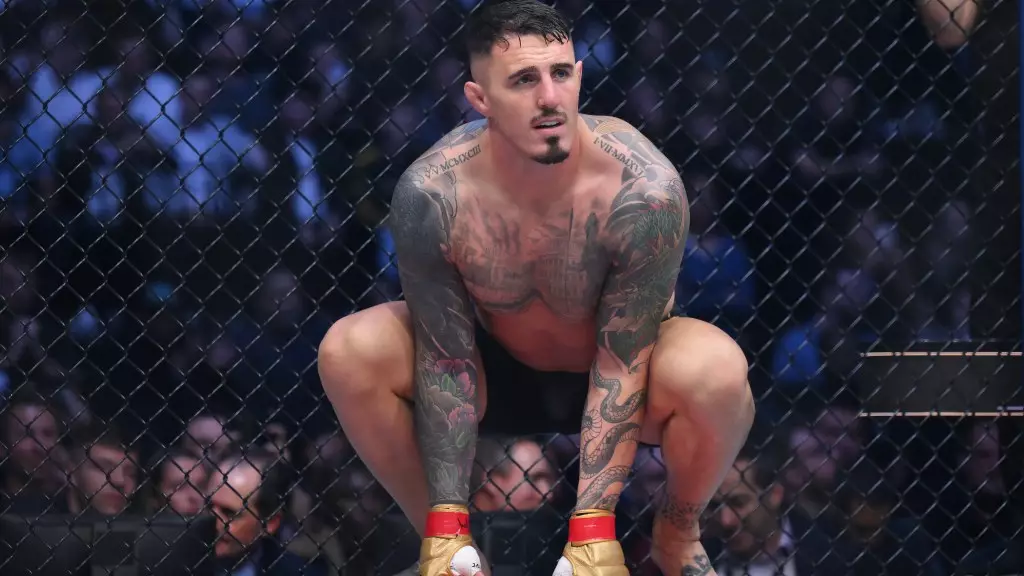In the realm of mixed martial arts, few names resonate like that of Jon Jones. The UFC heavyweight champion has been at the pinnacle of the sport for over a decade, and his career trajectory has been nothing short of remarkable. With a professional record of 28 wins against just one loss, Jones’ athletic prowess and strategic mind make him a formidable opponent for anyone in the octagon. Recently, in discussions about potential future bouts, the spotlight has shifted toward the interim heavyweight champion, Tom Aspinall. However, the dialogue surrounding this matchup reveals much about not only Jones’ current motivations but also the complexities of navigating high-stakes fights in the UFC.
The Role of Timing and Strategy
Jon Jones, now 37, is in a unique position where he doesn’t necessarily need to prove anything further. Brandon Gibson, Jones’ long-time coach, emphasizes that their approach is no longer about showcasing skills or silence doubters; rather, it’s about seizing opportunities that align with Jones’ personal and professional goals. Gibson articulated this sentiment during an appearance on SiriusXM Fight Nation, noting that Jones, being in a powerful position, has the agency to make calculated decisions regarding his fighting future. The UFC landscape is rife with contenders, each year introducing new threats to Jones’ title reign. Yet, Gibson believes that Aspinall is not fundamentally different from past challengers who have come and gone without a significant impact on Jones’ legacy.
Interestingly, despite the rise of Aspinall, Jones appears more inclined to pursue a title unification fight against light heavyweight champion Alex Pereira. Gibson insists that this strategic choice has nothing to do with fear or an aversion to facing Aspinall. Instead, it reflects a broader understanding of what is at stake in the fight game—both in terms of legacy and financial interests. Jones’ track record allows him to make these types of choices, creating a legacy that reflects not just victories but also how those victories are achieved and against whom they occur.
Gibson stresses the importance of timing and financial viability in fight negotiations, suggesting that for Jones, the fight game has to be mutually beneficial. He underscores the difference between wanting to see a fight from a fan’s perspective and the tactical decisions that must be made behind the scenes. More than ever, fighters are also business entities, needing to look out for their interests and the well-being of their families.
While Aspinall boasts an impressive record, with notable victories in the UFC, questions linger about his full potential given an average fight time of just two and a half minutes. Such brevity can be seen as a double-edged sword; on one hand, it shows remarkable efficiency, but on the other, it raises doubts about how he would fare in a championship fight that extends into the later rounds. Jones has a unique ability to exploit fighters’ weaknesses, drawing them into later rounds where his stamina and experience become lethal weapons. From this perspective, Gibson does not shy away from declaring that Jones represents a complex challenge for Aspinall.
Ultimately, the conversation about potential matchups extends beyond just strategies and statistics; it feeds into a narrative about legacy. As Gibson succinctly put it, “you don’t owe anybody anything.” This phrase resonates deeply in a sport where fighters often feel pressured to prove themselves against the latest contenders. In the end, Jones’ decisions will reflect not only his desires but his place within the UFC lore that he has helped shape over the years.
As fans await confirmation of future fights, the anticipation surrounding a potential Jones vs. Aspinall bout remains palpable. Yet, the nuances of fighting, business, and personal motivations create a landscape that is far more complex than the thrill of octagon competition. Jones’ continued evolution, as both a fighter and a strategist, reveals a man who is not just looking to add to his record but crafting a narrative that respects his legacy while preparing for the next chapter in an illustrious career.

